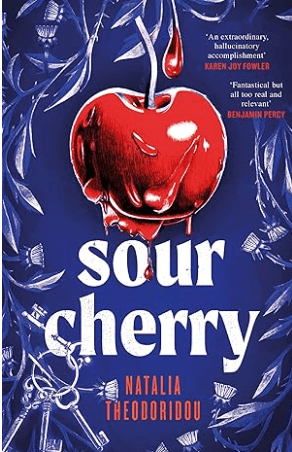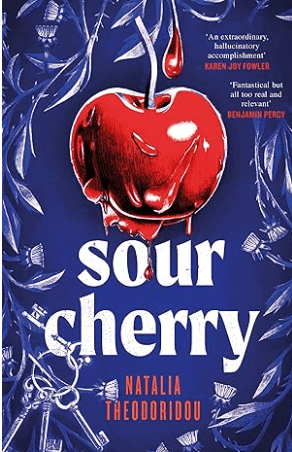
For all things fantasy, horror, and speculative fiction

Review Details
Review type: Book
Title: Sour Cherry
Author: Natalia Theodoridou
Publisher: Wildfire
Release date: 1st April 2025

Reviewed by: Rym Kechacha
Other details: Paperback RRP £9.99
Sour Cherry by Natalia Theodoridou
Book Review
Rym Kechacha
I think one reason fairytale retellings feel so rich is because they give us such a resonant way to look around–standing as we are, at a cultural crossroads–and interrogate the maps that led us here. These old stories help us ask: is this really where we want to go next? Though admittedly, they are often not so helpful if we answer: hell no.
What to do, then, with the kind of gleeful violence that the story of Bluebeard offers us? Angela Carter gave us a characteristically lush and baroque imagining of her Bluebeard’s lavish home with a satisfying revenge conclusion. Natalia Theodoriou in Sour Cherry moves her retelling of Bluebeard more into the realm of the symbolic, set in an unnamed, unspecific place that nonetheless puts us in mind of ‘fairy-tale land’, a place where people are linked with the land they live on and social hierarchies are both rigid and obvious. I found this out-of-time-ness an interesting choice that accurately conveys the absolute constant, eternal churn of male violence against women. Near the end of the novel, the author writes, ‘the land of the story is everywhere. The people are us, the time is always.’
Storytelling itself is a theme of the novel. It’s narrated by the most recent (and last?) wife, who is often joined by a chorus of the ghosts of her predecessors. I loved these moments as the novel engaged with its own telling and retelling, but I did occasionally want a little more clarity on who and what and where. This is a novel that delights in ambiguity and asks you to pay attention. The language is lush but considered and the narrator swerves as she’s speaking, changing her tone and hinting that she’s leaving things out or changing events to suit an imagined audience.
The jacket copy calls this an examination of toxic masculinity, but I’d disagree. The scope of the story is extremely tight, focused on the Bluebeard character who has quite a cloistered childhood and in adulthood rarely interacts with other men. So there is not the sense of this man living out the socially constructed version of what a man ‘should’ be–violent and entitled and economically powerful. This is a weakness, in my opinion. I wanted a bit more examination of how he gains and retains his power–beyond the fact that he’s rich. I was interested in the inversion of the symbolic alignment of women’s bodies with the land. Theodoridou’s Bluebeard poisons everything around him. Every trip round the cycle, the land ends up withering and dying and the only thing he can do is leave. So the novel becomes less about the choices the unnamed man might make about how he treats those around him, or how the surrounding women in his youth–his withdrawn mother, devoted nanny or complicit first wife–enable and excuse him, or why he is the way he is.
Truthfully, the author offers no answers or even clear questions as to why he is what and who he is. He’s referred to as ‘cursed’. He is an enigma in the story, a black hole which neatly reverses the paradigm so often found in news reports of femicide, where the victim is erased from her own death and the perpetrator is centred. Yet I admit I wanted something more from the author–or perhaps from the Bluebeard silhouette at the centre of the novel–some hint as to why he is like he is. Is he the victim of a curse who cannot help what happens to those around him? A man who is helpless to stop causing the life around him from rotting but nonetheless enjoys his effect? A man deliberately causing harm? A unique individual or an Everyman?
The book is conceptually wedge-shaped; it’s thick with story and character at the beginning and then becomes compressed and taut as the reader spirals through various unnamed wives who fall victim to their monstrous husband. Towards the end, the novel becomes repetitive, which always makes me stop and think. Why is the writer doing this? What are they trying to get me to think or feel here? In this novel, I felt that Theodoridou is trying to elicit a deeper feeling with the repetition, that it was an invitation to join the characters in the cycle of violence going round and round. For me to not only understand that the violence is going on and on and on as you read the words on the page, but also feel stuck along with the characters and scream along with them. It evokes the helplessness of reading about a man who murdered his partner who was convicted of assault against a previous girlfriend, stalking the girlfriend before that, and indecent exposure a decade ago.
It strikes me that both Carter’s and Theodoridou’s Bluebeards are mysteriously, opulently rich. Bluebeard is a beast who also squats over gothic and gothic-adjacent stories like Jane Eyre and Rebecca. His house is not yours and if you leave, you have nowhere to go. You were lucky he picked you and he can dispose of you any time he wants. You sit there and look pretty until he tires of you, and while you’re waiting for that, your only option is to excavate and tell the stories of those who came before you. The tale is a violent warning against what we might simplify into ‘tradwife’ content and the alarming global regression of women’s rights. His house is not yours until you come to haunt it.
Tags: AdventureFantasyFeministHorror
Category: Book Review
All reviews
Latest Reviews:
- Januaries by Olivie Blake
- Basic Roleplaying: Creatures
- Five Mini-Adventures – PDF (Shadowdark RPG)
- Cursed Scroll Zine, Vol. 1: Diablerie! RPG Zine
- Empire of the Dawn by Jay Kristoff
- The God and the Gumiho by Sophie Kim
- Citadel of the Moon by Mike Chinn
- Hemlock and Silver by T. Kingfisher
- Thirsty by Lucy Lehane
- Solodark RPG
Review tags:
Action (49) Adventure (70) Contemporary Fantasy (18) Fantasy (120) Gothic Horror (12) Harper Voyager (12) Historical Fantasy (14) Hodderscape (12) Horror (76) Orbit Books (33) Romance (28) Romantasy (13) Science Fiction (35) Titan Books (36) TorDotCom (12)
Leave a Reply